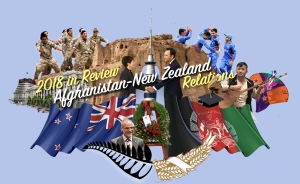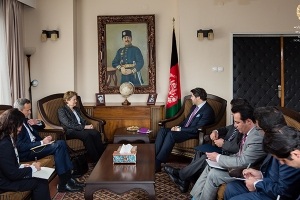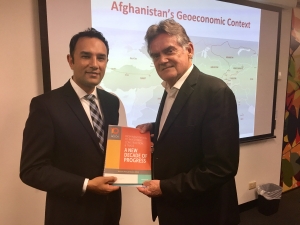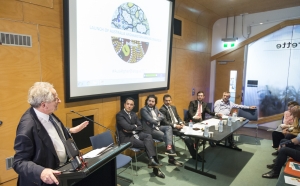Review of Afghanistan and New Zealand Relations in 2018
With 2018 drawn to the end, I take the opportunity to reflect on what has been an eventful and productive year as Afghanistan’s non-resident Ambassador to New Zealand.
This reflection builds upon a relationship established over the years, with the appointment of first Afghan non-resident Ambassador to New Zealand, as well as New Zealand’s first non-resident Ambassador to Afghanistan in 2003. The history of diplomatic relations extends past these first formal appointments, with New Zealand’s military contributions in Afghanistan in 2001, and New Zealand’s participation in reconstruction efforts. Since the beginning of diplomatic relations, the two countries have seen a significant growth in their unique relationship, which was furthered in 2017 and 2018 in a range of mutually interested areas.
New Zealand acts as one of the main allies of the United State and NATO, alongside Australia, and the expanding of ties with these countries is essential for Afghanistan’s future. Political engagement between our two countries increased significantly in 2018, with a number of high-level visits taking place between dignitaries from both countries. For instance, there were a number of high-level visits, including my official visit to the New Zealand,Deputy Minister of Defence in January – as well as the New Zealand Defence Minister’s visit to Kabul in the following month. These visits also enhanced public outreach and people-to-people connections, which are so crucial in bringing together Afghan and New Zealander communities, and contributing to the rich multicultural layout – with nearly 17,000 Afghan migrants residing in New Zealand.
Military and security developments also grew significantly, reflecting New Zealand’s dedication to promoting peace and security. In line with this, New Zealand upheld its commitment to maintaining stability and security in Afghanistan by increasing the number of its military personnel posted there by 13. The New Zealand Defence Force also extended its military training deployments in September for next year.
As part of the enhanced interaction with the political structure, Afghanistan and New Zealand developed a Friendship Group at the Parliament of New Zealand in October.
In the midst of the various political, security and development agreements, it is important not to overlook what was an exciting year for culture and sports. The opportunities for these types of engagement between Australia and Afghanistan increased significantly throughout 2018, one highlight of which was through the Under 19 cricket match between New Zealand and Afghanistan.
Another highlight was Embassy’s hosting the 99th Independence Day celebrations in Wellington for the first time. This was a well-attended event, with officials from New Zealand’s Government including Ministry for Foreign Affairs and Trade, along with members of the Afghan community in New Zealand and diplomatic representatives, all of whom enjoyed musical performances and official addresses.
Furthermore, the 37th Flag Raising Celebration outside Auckland Town Hall was held on 15thNovember, with Consular Corps members including Afghanistan in which the Afghan National Flag was unfurled for the first time on the site. This was in addition to Afghanistan’s participation at Waitangi Day, showcasing the growing level of engagement between both countries and acknowledgement of their respective histories.
Another significant achievement in the Afghanistan-New Zealand relationship was that Afghanistan appointed its first Honorary Consul to New Zealand, Mr Yasin Hotaki, who commenced the position to facilitate consular related services of Afghanistan for those Afghans residing in New Zealand, with a greater focus on trade and business. Mr Hotaki is a resident in Auckland with consular jurisdiction throughout New Zealand.
Just as the new year is a time to reflect on what has passed, so too is it a time to look forward to the coming months and the opportunities and developments they bring. As New Zealand and Afghanistan go forth in their relationship, the focus will be on cooperation in the fields of security, agricultural development, growth of exports and education. The numerous achievements across all of the areas highlighted above set us in good standing for an equally, if not more successful 2019. As we progress with this year, myself and the staff at the Embassy of Afghanistan would like to extend our sincere thanks to the Government and people of New Zealand and to the Afghan communities across New Zealand and wish you all the best for 2019.
Wahidullah Waissi
Ambassador
Deputy Foreign Minister Meets with the Secretary of the Department of Foreign Affairs and Trade of Australia
KABUL – Deputy Foreign Minister Mr. Hekmat Khalil Karzai met this afternoon with the Secretary of the Department of Foreign Affairs and Trade Ms Frances Adamson in the Ministry of Foreign Affairs.
Referring to the important relations between the two countries, Mr. Karzai said that the cooperation of Australia over the last one and a half decade has positive effects on the lives the Afghan people.
Mr. Karzai also provided information on the current political and security situation of the country; achievements of the Afghan government in the fields of good governance, counter terrorism, peace process, regional cooperation and the fight against corruption, as well as assured of the Afghan government commitment to take further steps in this regards.
In return, Ms. Adamson reassured of her country’s continued cooperation with Afghanistan in different spheres, and added the commitment that Australia has given in international conferences to cooperation with Afghanistan will be implement to improve security and provide assistance to the Afghan people.
Ambassador Waissi Talks about Geopolitical Context of Afghanistan in Queensland
Brisbane - The Queensland branch of the Australian Institute of International Affairs (AIIA) was hosted HE Ambassador Wahidullah Waissi for a keynote speech on 18 May 2017. AIIA QLD President Geoffrey Ewing welcoed Ambassador Waissi for accepting their inviration.
The main topic of discussion was about Afghanistan's Geopolitical Context, which was presented by Ambassador Waissi. Around 50+ participants from academia, civil society, think tanks, students and those who were interested to know more about Afghanistan were gathered at the AIIA center in Brisbane.
Ambassador Waissi gave detailed insights over Afghanistan's geo-political structure from national, regioanl and international points of view.
The session was ended through a Q&A session by the participants. Mr. Ewing also granted AIIA's honorary membership to Ambassador Waissi.
Launch of the Australia-Afghanistan Dialogue
Brisbane - The Embassy of Islamic Republic of Afghanitan has launched the Australia-Afghanistan Dialogue platform in Brisbane on 27 November 2017. The Dialogue aims on developing new paradigm of relationship between Australia and Afghanistan, grounded in strategic discussions between the two countries, and strengthening existing ones, through people to people contact and collaboration.
A delegation from Afghanistan, Australian Government, think tanks, academia, students, activists, Afghan-Australian Community, journalists and civil society and private sector representatives participated in this dialogue.
From Afghanistan, former Minister of Agriculture, Mr. Assad Zamir, Head of ToloNews, Mr. Lotfullah Najafizada, and Head of the ArtLords, Mr. Omaid Sharifi was headed by the Afghan Ambassador to Australia and New Zealand, Mr. Wahidullah Waissi, represented Afghanistan. From Australia, Ms Krista Adams, Chair for Finance & Economic Development and Councillor for Holland Park, who had an opening speech on behalf of the Queenslad Government, Dr. Maximilian BrandleOAM, former Director for the Institute of Modern Languages, University of Queensland; and Mr. Pete Lewisis, the director of Brisbane-based consultancy Way With Words. The event was moderated by Dr. Lee Duffield, a prominent Journalist, Researcher and Research Associate, Pacific Media Centre, Auckland University of Technology, in New Zealand.
Ambassador Waissi had the opening remarks. He called the Dialogue as an initiative for closer tie between two nations. He said "Such dialogue will be an important means for Australia and Afghanistan to identify areas of greater future cooperation not only on inter-governmental level, but also to foster people-to-people awareness and understanding between citizens."
Ambassador Waissi continued: The Australian Government has continuing engagement with Afghanistan in the areas of security and economic cooperation through bilateral, regional and multilateral dialogues.
Australia and Afghanistan share a friendly and long-standing relationship. Relations can be traced back to the 1860s when Afghan cameleers came to Australia. For half a century, the cameleers played a crucial role in the exploration and development of the Australian outback, ferrying supplies across the continent. The Ghan is named in their honour.
The next wave of Afghan migration to Australia followed the Soviet Union’s occupation of Afghanistan when thousands fled their homeland. The Afghan-born Australian population is about 70,000. Afghanistan is one of Australia’s largest sources of permanent migrants.
The first diplomatic link between Australia and Afghanistan was established in March 1969, when a non-resident Australian Ambassador was accredited to Afghanistan. The first resident Australian Ambassador to Afghanistan was appointed in 2006.
Krista Adams, said: The dialogue acts as a platform for expanding the relationship and really important for us to identify all areas of cooperation whether it is inter-governmental or people to people. It is warming up in Brisbane and hope this expands to other cities.
Agriculture is the backbone of the economy that engages 70% of Afghan population. Dry land is an area of cooperation between two countries said by Assadullah Zamir, Ex-Minister of Agriculture in his remarks at the Dialogue.
"One of the great agriculture success stories in Australia has been our export and agricultural expertise, particularly dry land farming expertise. The Queensland Alliance for Agriculture and Food Innovation (QUAAFI) is an interesting project to be applied in Afghanistan." Pete Lewis mentioned in his remarks.
Lotfullah Najafizada, Head of ToloNews said: I am here today to thank you for what you have done as a country and being part of the global campaign, to make life better, to make mothers hopeful, and make their sons and daughters more ambitious for your future. You certainly made a difference.
Dr. Maximilian Brandle OAM was talking about the culture of tolerance and acceptance in the era of globalization. He said "Our laws and ways of interacting with Afghanistan must be compatible with Islam. We need to learn to interact with more successfully with the 5% of Australia’s Islamic population. Afghans were the first Muslims came to Australia."
Omaid Sharifi, Co-Founder and President of ArtLords, was the last speaker of the event. "We use art as a tool for social change, change the perception of people and their attitude and help them do something for their own communities at the same time. That really encourages critical thinking among youth in Afghanistan." said by Omaid Sharifi.
The Afghan delegation had their next stop in Sydney, where they plan to have a meeting with the AIIA Sydney Branch, participate at the War Memorial last post ceremony in Canberra and participate at the Asia Society annual conference in Melbourne, which is planned on 1 December 2017.
This dialogue aims to have its events in Kabul and Canberra on annual or periodic basis.





